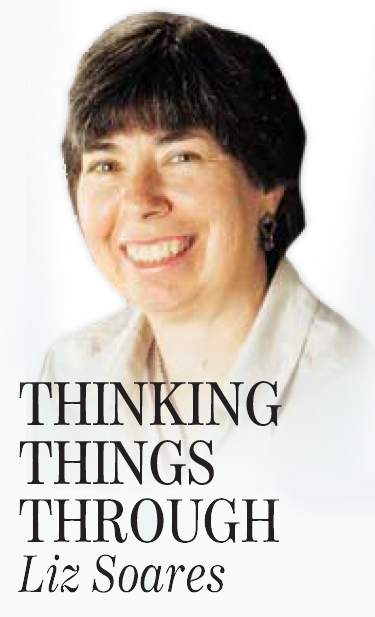I mentioned in a previous column that I had once worked in an all-male newsroom.
The context was the rash of men in many fields, including journalism, who have been accused of sexually inappropriate behavior. Though our newsroom easily could have forgotten me and descended into a locker-room mentality with its corresponding “we’re all guys here” attitude, it never did.
In fact, I remember only one awkward gender-oriented situation. As Christmas approached, I thought it would be grand to have a holiday buffet lunch. Everyone could bring something. Well, no. The men donated money to buy food, beverages and utensils, but I had to set up the party myself.
When it came time to eat, everyone thought the luncheon was a terrific idea. But since they were newspaper reporters, they took their plates back to their desks and ate while continuing to work.
Merry Christmas to me!
This newsroom was a bureau of the Providence (Rhode Island) Journal, located in nearby Fall River, Massachusetts. It was a first-floor former storefront — one big office with a small break room. Next door was an old-fashioned luncheonette, the kind with booths sporting vinyl upholstery. Two doors down was a bakery. It was a convenient location.
At the front of the room sat our bureau chief. He was a former Catholic priest. In fact, he was my former priest, having led my family’s parish in the suburb of Somerset while I was growing up. This was not as awkward a situation as it sounds, although I sometimes I had flashbacks of him in his Roman collar.
It was the 1980s. There were computers in the newsroom (more like simple word processors), but they were lined up on a long table. The personal computer would not be widely available for a few years. The Internet was a decade away.
I was happy with the ease of writing on a computer, especially the ability to correct myself as I wrote. Still, I remember feeling scared when I hit send. Where, exactly, did my work go? Had it really been sent?
I earned my journalistic chops at the bureau. There was one editor over in Providence who was always making me rewrite, or asking me a dozen questions about a story. This annoyed me, because I often wrote about selectmen’s meetings in the neighboring rural town of Westport.
I always bit my tongue and did what was asked. One day, I was assigned to cover a big anniversary — possibly the 100th — of the Woman’s Club of Fall River. Groan. How was I going to make anybody want to read that? Once I got to the lovely historical building that was the club’s headquarters, however, I discovered its history was fascinating. Through the Chautauqua movement of the late 19th and early 20th centuries, the club brought speakers, authors and entertainers to Fall River. The aim of the Chautauqua was to provide lifelong learning for adults.
Now, that was something to write about. Women in that time period did not have many opportunities. The chance to participate in intellectual activities would have been powerful.
Lo and behold, my picky editor loved it. I guess he hadn’t been looking forward to this article either and was thrilled that I was able to turn it into something more than a fluff piece.
This being Fall River, our bureau chief was obsessed with Lizzie Borden, the woman acquitted of murdering her father and stepmother in 1892. I could understand. I was, too.
Our oldest reporter was a dear man who was proud to be Irish-American. Every year, when the new phone book came out, he would count the number of people with his common surname and compare it to the number of people named Raposa (a common Portuguese surname). He would be relieved when he learned that the Irish were still in the lead.
A new reporter named Paul arrived in 1983. We started dating and tried to keep it secret, but word soon got out. We married in 1986, the same year we moved to Maine.
The journalistic world has changed exponentially since then. The changes, in fact, already had begun. But in my memory lives a small newsroom, full of cigarette, cigar and pipe smoke; the phone constantly ringing with another funeral home calling in an obituary, which we had to write down word for word. As deadlines approached, the energy level rose. A fire at 5 p.m., when we were trying to wrap things up for the morning paper, was everyone’s worst nightmare.
Ah, those were the days.
Liz Soares welcomes e-mail at lsoareswriter@gmail.com.
Copy the Story LinkSend questions/comments to the editors.



Success. Please wait for the page to reload. If the page does not reload within 5 seconds, please refresh the page.
Enter your email and password to access comments.
Hi, to comment on stories you must . This profile is in addition to your subscription and website login.
Already have a commenting profile? .
Invalid username/password.
Please check your email to confirm and complete your registration.
Only subscribers are eligible to post comments. Please subscribe or login first for digital access. Here’s why.
Use the form below to reset your password. When you've submitted your account email, we will send an email with a reset code.